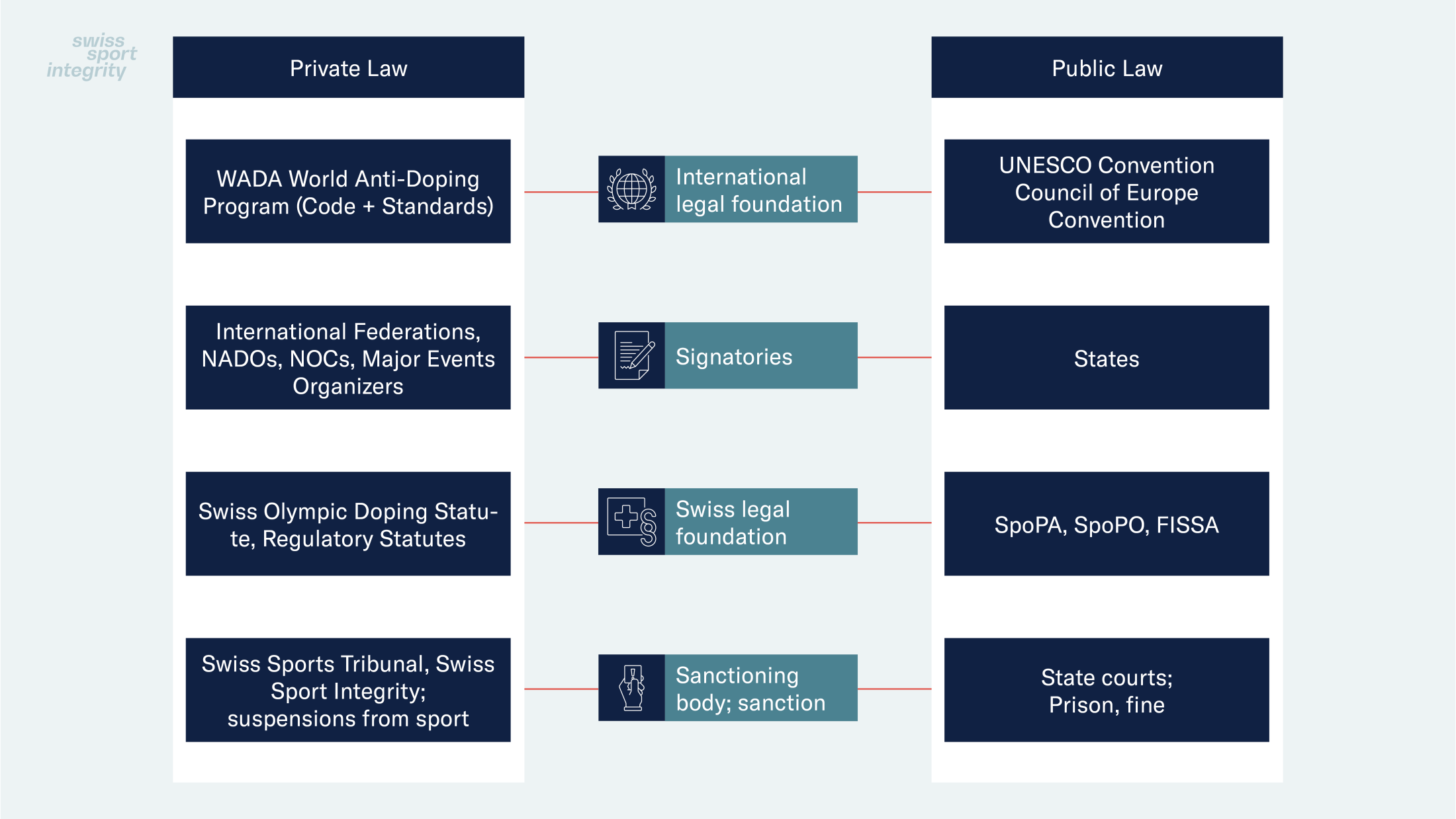The legal foundations for clean sport are laid down in federal-level laws, on the one hand, and in the rules of sport under private law, on the other. The provisions of the World Anti-Doping Code (WADC) and of the Swiss Olympic Doping Statute (the “Doping Statute”) form part of the rules of sport. These provisions protect the right of athletes to a doping-free environment, and to fair competition.
Private Law
World Anti-Doping Programme
The World Anti-Doping Program (WADP) is designed to protect the spirit of sport. WADA’s mission is to foster and harmonize international anti-doping activities in all areas. The Program is mandatory for all nations and for all sporting disciplines which have opted to adhere to the WADP. The signatories to the Program are International Sports Federations, National Anti-Doping Organizations, National Olympic Committees, and the organizers of major sporting competitions, such as the IOC and FISU.
The most important elements of the WADP are the World Anti-Doping Code and the International Standards.
World Anti-Doping Code
The Code provides the foundation for international efforts to combat doping. In essence, it provides a constitution for clean sport. The Code was drafted giving consideration to the principles of proportionality, human rights and public health.
Its provisions are set out in greater detail in eight International Standards, which are also applicable world-wide.
Swiss Olympic Doping Statute
The Swiss Olympic Doping Statute implements the World Anti-Doping Code in Switzerland. Its content is largely identical to that of the Code, and it provides a standard basis for anti-doping provisions in Swiss sport. Where necessary, the WADA’s International Standards are repeated in Swiss Sport Integrity’s Regulatory Statutes.
Public Law
Federal Constitution
Art. 68 para. 1 of the Federal Constitution of the Swiss Confederation states that “the Confederation shall encourage sport.” Based on this provision, it should therefore also counter the negative aspects of sport, including doping, and should therefore endeavor to combat such practices.
Federal Act on the Promotion of Sport and Exercise
The Federal Act on the Promotion of Sport and Exercise (SpoPA), and the corresponding Ordinance (SpoPO) make punishable the manufacture, acquisition, import, export, conveyance, arrangement, sale, prescription, market launch, provision, and possession of substances for doping purposes, as well as the use of prohibited methods on third parties. This means that the criminal prosecution authorities will investigate, and judgments will be passed by state courts. Sentences range from a fine to imprisonment.
If the manufacture, acquisition, import, export, conveyance, or possession of doping substances are exclusively for personal consumption, the offender is not liable to a penalty. However, the import of any quantity of prohibited doping substances remains prohibited under Article 20. Irrespective of any criminal proceedings, the police may in any case confiscate all doping substances and forward them to Swiss Sport Integrity for evaluation and destruction.
Federal Act on the Federal Information Systems for Sport
The Federal Act on the Federal Information Systems for Sport (FISSA) creates, among other things, the legal foundation for the electronic processing and exchange of personal data by Swiss Sport Integrity as part of its efforts to combat doping.
International Conventions
The foundation for legislation in Switzerland is provided by two conventions under international law: The Council of Europe Anti-Doping Convention, and the UNESCO International Convention Against Doping in Sport.
The Council of Europe Convention became the first internationally binding anti-doping regulation, when it was signed on November 16, 1989, by the member States of the Council of Europe, in addition to a number of other countries. With a view to the reduction and eventual elimination of doping in sport, the states parties undertake to implement the steps necessary to apply the provisions of the Convention. The Convention has been in force in Switzerland since January 1, 1993.
The UNESCO Convention is considered as the first global international treaty against doping in sport. On October 19, 2005, the General Conference of the United Nations Educational, Scientific and Cultural Organization (UNESCO) concluded the International Convention against Doping in Sport. The aims and structure of the UNESCO Convention are based heavily on those of the Council of Europe Convention. The Convention came into force in Switzerland on December 1, 2008. It contains 2 annexes, which form an integral part of the Convention. Annex I contains the current Prohibited List of the World Anti-Doping Code. Annex II contains the International Standard for Therapeutic Use Exemptions in its current form.
